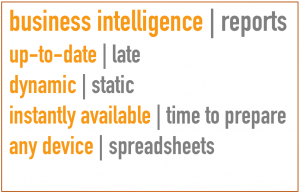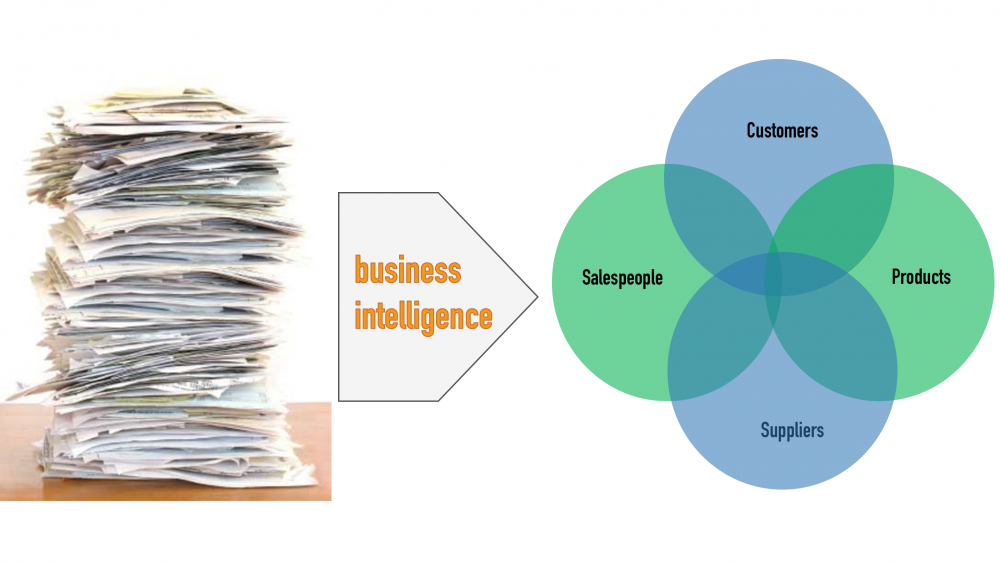Understanding Business Intelligence.
Business Intelligence (BI) systems have revolutionised how business owners and management understand, analyse and run their business. Ask our friend Google –
“Business Intelligence is a technology driven process for analysing and presenting actionable information to help corporate executives and business managers and other end-users make more informed business decisions.” ( Reference source )
Let’s unpack two points from that statement.
“Analyse and present actionable information”
Fact: You can find insight from within the data inside your accounting system.
Assume we have 10,000 sales invoices that represent the previous few years of businesses trading. That information contains the best and worst history of that business and it will reflect the best and worst decisions that were made represented by the best and worst products, salespeople, regions, channels, customers, trading periods etc. These are the dimensions of the business activity.
If you could just choose to do less of the unsuccessful stuff and more of the successful stuff you’ll make the business far more profitable. So simply manage out the worst 10% of performers and manage up the best 10% and you will make a positive impact.
“Help corporate executives and business managers make more informed decisions”
You start by asking the questions about the data and manage the extremities – but how?
You won’t look at every invoice and build a top N and bottom N list for each dimension. That would take too long.
You could use a spreadsheet, get some data imported, create some pivots. It’s a starting point but will take your time and spreadsheets make you do all the work.
Spreadsheets may be free but it costs a lot of time and money to feed them.
There are better “actionable formats” and although you may know how to use a spreadsheet that doesn’t mean you should.
Is your business better advantaged by your spreadsheet skills or by the insights found and the decisions made?
There is a better way and that is with a program specifically designed to empower you to ask the questions without having to program the answers. Self Service Business Intelligence.
Business Intelligence tools have become very inexpensive because of a significant pivot in how software is provided – It’s delivered on the Cloud and you pay for it as you go.
The Cloud and APIs
Modern software is delivered as a service that runs on servers on the Internet and is paid for by subscription. These services deliver what they do best and allow other products to work with them by providing the ability to interface with them using an API (Application Program Interface).
On the cloud the individual Installation, implementation and hardware costs have been removed. You can sign up for a free trial and see if the software meets your needs without spending a cent. Often you teach yourself by tutorials and videos, largely eliminating implementation costs.
These products can grow to thousands of users very quickly. In the SME Accounting software space MYOB AccountRight has 1.5 million users and Xero has 1 million.
With such an enormous pool of opportunities, integrated Add-On products that work with them can be provided as an inexpensive subscription service.
Using the Accounting software’s API the Add-On solution can seamlessly access the data and so all that is required is your authorisation to connect.
Business Intelligence vs Reports
The Accounting software packages include simple reports and you may say why do I need Business Intelligence?
Because with BI you will find the outliers faster, you can drill down and get the facts and take action.

How can I test drive Business Intelligence ?
If you google “Reporting Add-ons for MYOB” and scroll past the paid adverts you will be able to read about each product and usually be able to get a free trial.
Alternatively use this shortcut Evaluating Bi4Cloud where you can try out BI4Cloud for yourself.
User Stories
If you’re not quite ready to try our free trial you can read how some of our Clients and Advisors have been helped with BI4cloud in their business.



Comments are closed.